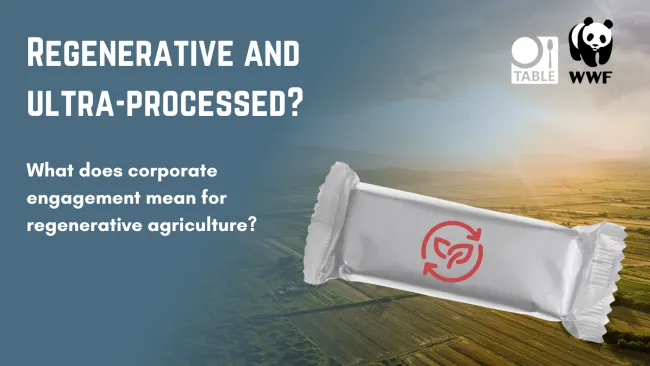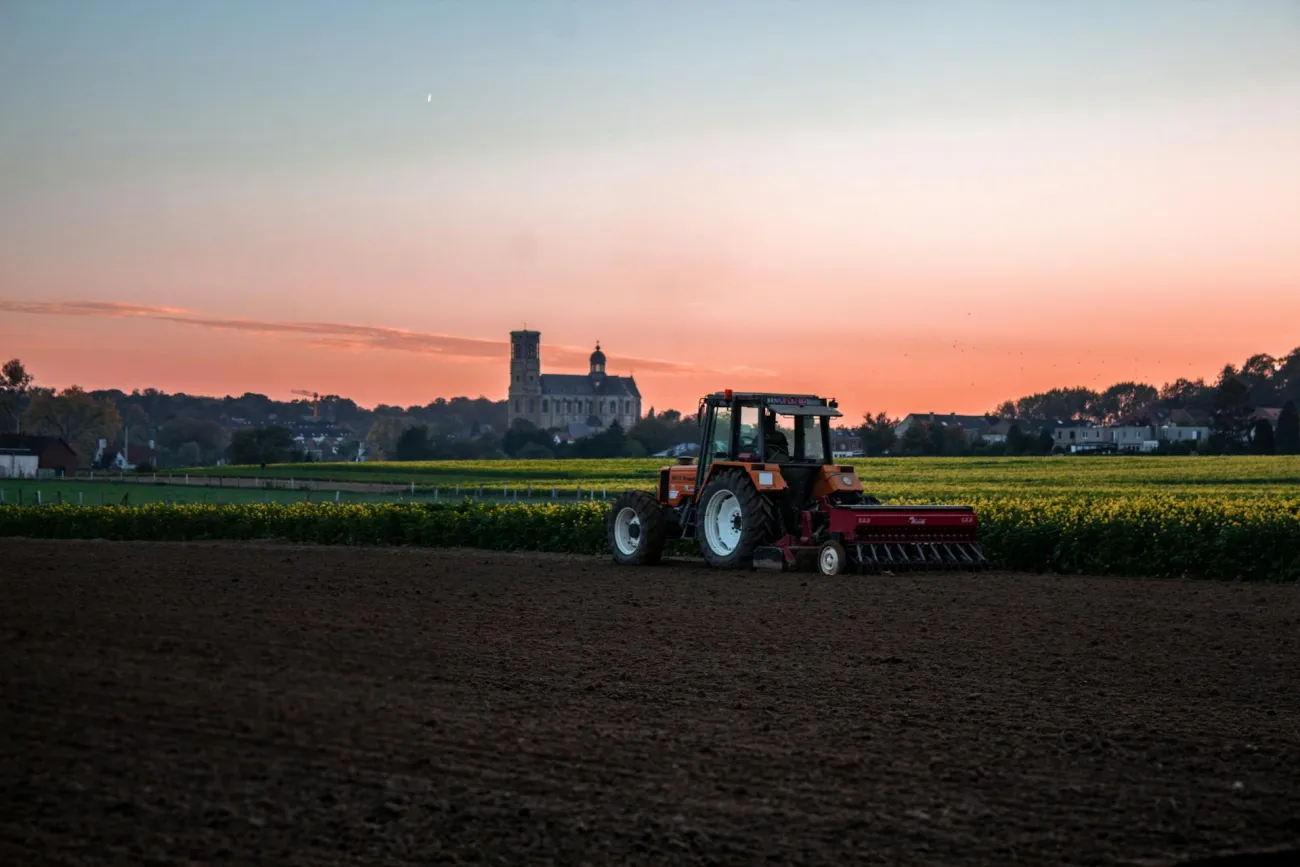Summary
A decade ago, few people had heard of the term “regenerative agriculture”, let alone used it to describe their work. But over recent years, the concept has become increasingly popular amongst food systems actors. Once the purview of farmers and conservationists, regenerative agriculture has recently gained interest from food corporations and big business.
It seems regenerative can now be used to describe a dizzyingly broad range of practices and visions for agriculture and food systems. Is it possible to pin down the different definitions and find commonalities or clear distinctions? Can regenerative agriculture be meaningfully adopted and practised by major food corporations, or are the goals and practices shaping corporate food systems diametrically opposed to the ambitions of regeneration?
A Pool of Meanings
On 11th January, in the first of two events, TABLE posed these questions to four stakeholders from across the corporate, agriculture and charitable sectors: Matthew Ryan (Nestlé UK & Ireland), Melissa Ho (WWF-US), Sara Farley (The Rockefeller Foundation), and Jyoti Fernandes (Landworkers’ Alliance). For Ryan, opening the discussion from Nestlé’s viewpoint, increased interest in regenerative agriculture stemmed from a recognition that “business as usual” is no longer an option. Given the stress placed on the earth’s ecosystems by conventional agriculture, he suggested that regenerative agriculture offered a positive path forward. What does Nestlé actually mean by the term, though? According to Ryan, regenerative agriculture “aims to restore farmland and the ecosystem it depends on and thrives in.” Beyond that, it’s a relatively loose idea, which takes “a middle ground” by drawing from more defined approaches, including “conservation agriculture”, “precision farming”, and “agroecological principles.”
Ho, speaking for the WWF, pointed out that when it comes to food and farming, this isn’t just about mitigating the impacts of agriculture on the earth’s ecosystems, but also providing ways to cope with the instability in food systems created by climate change and ecosystem degradation. She argued that regenerative food systems have “potential to be part of the solution” if a “holistic” definition is used, which includes a broad set of social goals including impacts on human health, livelihoods and economic impacts, as well as the concerns of “planetary health, climate, and nature.” The WWF defines regenerative agriculture “very broadly in that regard.” For Ho, regenerative agriculture welcomes corporate engagement, but sees change as starting “on the front lines” with producers.
How restrictive is the WWF’s conception of regenerative agriculture? “It’s a journey we’re on” says Ho, using a metaphor that’s common to these discussions. Anyone that subscribes to agroecology, nature-positive frameworks or nature-based frameworks is part of that movement, but what’s needed now is to “create the shared vision of what good should look like.”
These somewhat expansive definitions of regenerative agriculture, which conceive of it in terms of a pathway to be joined, are not incompatible with corporate engagement. But for Jyoti Fernandes, policy lead for the UK-based Landworkers’ Alliance and a smallholder farmer, “corporate control of the food system” is creating conditions that undermine the pursuit of agroecology, where that includes the wellbeing and livelihood of farmers, access to nutritious and affordable food, and equitable access to land. Fernandes suggests that there is a competition for resources globally that doesn’t make sense for a good food system. For the Landworkers’ Alliance and other members of the global peasant movement, La Via Campesina, the aim is to protect and augment the “agroecological food webs” of production, distribution, and consumption. “We juxtapose that against the industrial food chain”, which is enormously resource intensive. It doesn’t make sense to talk about transformation of the corporate model, when it “feeds into a system” that competes with and undermines small scale farmers and indigenous peoples’ access to the resources of food production.
If these three interpretations seem to operate at different degrees of depth and robustness, a good analogy for that was offered up by Farley, speaking for The Rockefeller Foundation. We might think of the current state of the debate in terms of a swimming pool, with a shallow and deep end. At the shallow end, definitions of regenerative agriculture entail “a greater focus on soil and carbon sequestration”. In the middle, definitions involve a “broader suite of environmental outcomes”, including building back biodiversity loss and water retention in the landscape. At the deep end, “deep regeneration” largely means agroecology, and it means putting concerns of equity, and the wellbeing of farmers and communities at the centre of the discussion.
A complementary way to parse these three tiers is suggested in TABLE’s explainer on the topic: the first is about regenerative agriculture as a set of practices; the second understands regenerative agriculture in terms of a set of outcomes; and the last sees regenerative agriculture as a mindset which holds at its centre the potential “co-vitality of humans and nature.”
For Rockefeller, the aim is to get to this deep end, but the challenge is that farmers “by and large are being asked to figure this out” without support from governments or corporations. Ryan, meanwhile, is content to agree that Nestlé is “jumping into the shallow end with our floats on.” But while this neat image of a clean blue pool suggests a silky, frictionless transition from shallow to deep, Ho is sceptical that corporations’ heavily processed, globalised products can be meaningfully integrated into the “journey” of regeneration. “When we holistically define” a good food system to include human health, “food security should be food inherently delivering nutrition.” If global funding and resources are going to corporations in the shallow end who are still producing unhealthy ultra-processed products, rather than to essential foods, that is a poor use of finite resources. What’s more, adds Ho, many ultra-processed foods produced from just a handful of key crops are feeding into a “dependency on monocultures” that are “driving down” the world’s agrobiodiversity. In other words, perhaps it’s not possible for global corporates to thrash about in the shallow end without losing water from the middle and deep ends of the pool.
The distribution of resources is undoubtedly one of the key challenges for regeneration, says Farley. Rockefeller and other philanthropic organisations have calculated that a transition to regenerative agriculture would cost between 250 and 430 billion dollars a year for at least a decade. That may seem like a shocking number, but more than 650 billion dollars a year already go to food and agriculture subsidies. For Farley, this is a “perverse incentive” structure that entrenches conventional agriculture, where it could be repurposed to fund the regenerative transition.
Regeneration and the Politics of Knowledge
While the discussion came back several times to this question of the politics of resource distribution, the debate over regenerative agriculture is also a question of the politics of knowledge: whose definition of regenerative agriculture is taken seriously, who gets to decide what counts as evidence or proof, and who gets recognition and funding for their research?
For Fernandes, the most important experimental research is happening with peasant farmers. They are the “best innovators on the planet”, working with over 2 million varieties of seeds. Meanwhile, the industrial food system, “which gets most of the research and development money”, focuses on just 137 crops, with almost half of the research budget going to maize alone. What’s needed instead is systematic and strategic support for grassroots open source research to enable ongoing work and the dissemination of important knowledge.
Farley, meanwhile, took the view that there needs to be an “agenda of radical inclusion” on discussions around food systems, and that the aim should be to create “the broad table that we’ve never created before to think about food systems transformation.” Ryan, meanwhile, pointed out that Nestlé’s work increasingly recognises the value of bringing diverse actors to the table, and of incorporating farmer knowledge and demands into discussions. “We aren’t going to get anywhere if we are prescribing”, he said, suggesting that decisions need to be made in conversation with multiple stakeholders rather than taking a top-down approach. The corporation’s Landscape Enterprise Networks (LENS) attempts to do just that, brings together a wide range of businesses and farmers operating in a specific landscape to develop a coherent set of environmental demands and requirements on both sides.
While there is an increasingly widespread recognition that top-down knowledge and decision making isn’t a viable way forward, the question remains whether bringing a greater diversity of agents and expertise to the table amounts to a genuine ceding of power and control. Fresh from the discussions at COP28, Fernandes suggested that these multi stakeholder discussions operate as “an unlevel playing field” that serve to benefit the reputations and agendas of the most powerful actors. In loudly celebrating major food corporations’ social responsibility programmes, “the greenwash shines so bright” that it obscures the fact that the same corporations are actively “dismantling” existing sustainable food systems. Competition for carbon markets is now aggravating these problems, she added, since there’s now “a lot of competition” for land on which to plant trees, while organisations aren’t taking meaningful measures to reduce their emissions.
With time running out on the discussion, there were still many questions to discuss and explore further. Are the current debates over regenerative agriculture actually operating within the same swimming pool of ideas and hopes, or does this apparent common language mask deeper and more intractable differences? If corporations are welcomed into this space, does that push others out, or is it a sign of a genuine shift in the agenda? How do we engage with the challenge of corporate greenwashing in this space? Can ultra-processed foods be meaningfully located within a framework of regenerative agriculture? And finally, can there be any such thing as a “shared vision” amongst such different food system actors? What, if any, are the minimum basic principles of regenerative agriculture upon which everyone might agree?
All these questions and more remain open for the second part of the discussion on 7th February.
Watch the recording for Part 2 here.
Event summarised by Hester van Hensbergen. This is TABLE's account of the event and any commentary included is our own and does not imply endorsement by the panellists participating in it.





Comments (0)